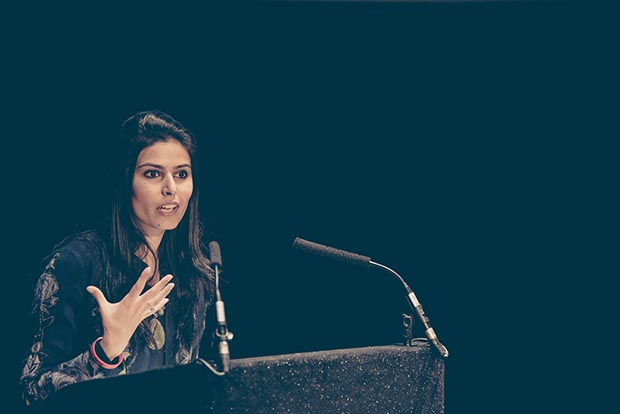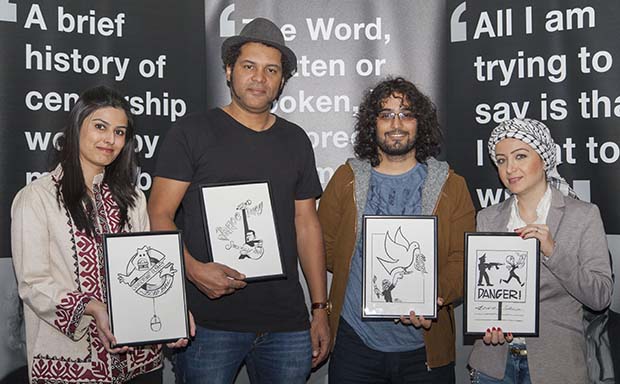
Farieha Aziz, director of 2016 Freedom of Expression Campaigning Award winner Bolo Bhi (Photo: Elina Kansikas for Index on Censorship)
Pakistan’s Prevention of Electronic Crimes Bill 2015, better known as the cyber crimes bill, has severe implications for freedom of expression and the right to access information in the country.
After a lengthy process, the bill was signed into law on 22 August 2016. Bolo Bhi, the Pakistani non-profit promoting digital freedoms and winner of the 2016 Index on Censorship Freedom of Expression award for campaigning, has been fighting the bill through all it’s stages and will continue to do so even now it has been approved.
“We are looking at what will be the right approach and the current debate is whether we jump to court and challenge it on constitutional grounds or wait for there to be an executive review and then build a case around it,” Farieha Aziz, director of Bolo Bhi, told Index on Censorship.
Bolo Bhi has reached out to other organisations and individuals, including the Human Rights Commission of Pakistan and several lawyers, during its campaign against the bill, and if legal action is to be taken it will be a class action involving all of all of these parties.
“We’ve gotten some of the best constitutional minds in the country to start looking at the law and where we go from here,” Aziz said.
Such action would be costly and, as pro bono doesn’t always guarantee success, the group have begun reaching out to people who may be able to provide support.
At this early stage amendments to the bill won’t be possible. “So we want to build pressure through public dialogue in terms of what’s wrong with the bill and what needs to be fixed,” Aziz said. “We will also raise awareness of how this law can be used against various communities.”
Pakistan has a large youth population – they very people having most conversations online – and they need to know how the bill will impact them, Aziz explained, so Bolo Bhi has been doing a lot of work with students. “We want to see the youth take ownership of this issue and see that discussion around such laws should not be relegated to the legal fraternity or the legislature.”
In terms of building pressure, the movement needs that student community voice. “It’s something we can’t leave untapped,” said Aziz.
Fighting the bill took up a lot of Bolo Bhi’s time over the past year and the organisation doesn’t currently have a staff beyond Aziz and fellow director Sana Saleem, nor an office in which to work from.
But fortunes may be changing. As Index spoke with Aziz, a possible fund to cover operational costs and salaries for a year was on the cards for Bolo Bhi. The organisation has always been small and even with this funding it would remain so, allowing it to stay focused on certain issues.
“And maybe in the next month or two we will even have an operational office again,” Aziz added.
With this in mind, Aziz is hopeful that Bolo Bhi will be send more time on its gender work. “We’re members of the Women’s Action Forum and with the recent passing of the anti-domestic violence bill there’s been a lot of discussion on the provincial protection of women, so that’s something we are focusing on,” she said.
On a case-by-case basis, a lot of victims and survivors of abuse get in touch with the network. “Just yesterday we spoke to a young girl who was forcibly married at 15, is now divorced with a young child and is being harassed by her own family,” Aziz explained. “We’re now trying to get protection and see what legal proceedings are necessary.”
This is just some of the work that goes on on the side and is what Aziz hopes she can do more of in future.
As always, the main challenge is funding.
“While it’s important for us to keep on top of the issues, at the same time we’re trying to get enough support to keep us afloat.”
Also read:
Smockey: “We would like to trust the justice of our country”
Zaina Erhaim: Balancing work and family in times of war
Artist Murad Subay worries about the future for Yemen’s children
GreatFire: Tear down China’s Great Firewall
Nominations are now open for 2017 Index on Censorship Freedom of Expression Awards. You can make yours here.





